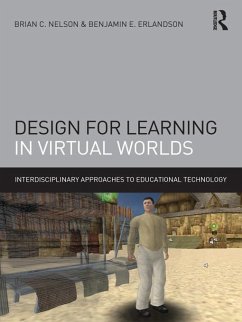This text explores the history and evolution of virtual worlds, the theories behind the use of virtual worlds for learning, the design of curricula in virtual worlds, design guidelines for elements experienced in virtual worlds that support learning.
Dieser Download kann aus rechtlichen Gründen nur mit Rechnungsadresse in A, B, BG, CY, CZ, D, DK, EW, E, FIN, F, GR, HR, H, IRL, I, LT, L, LR, M, NL, PL, P, R, S, SLO, SK ausgeliefert werden.


